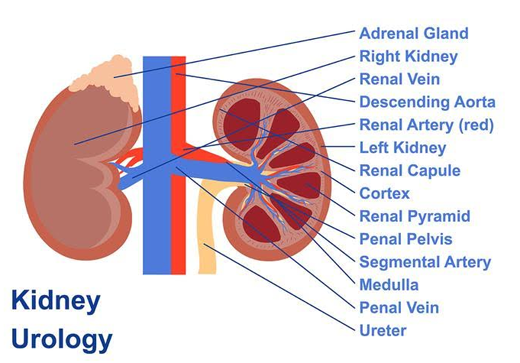Urology
 Urology will prepare you to meet the challenges of current and future urologic medicine and surgery. All this provides a platform for further advancement of your scientific knowledge, innovative and forward thinking, career progression and camaraderie with fellow students. Urology is a surgical specialty dealing with the problems associated with the urinary tract and it deals with cancer, non-cancer, functional problems and diseases. In urology many problems can be managed with medications. This surgical field is constantly evolving with technology being the main driver. Improvements have been made through lasers, optics, gadgets and robotics Regenerative medicine is fast evolving in urology.
Urology will prepare you to meet the challenges of current and future urologic medicine and surgery. All this provides a platform for further advancement of your scientific knowledge, innovative and forward thinking, career progression and camaraderie with fellow students. Urology is a surgical specialty dealing with the problems associated with the urinary tract and it deals with cancer, non-cancer, functional problems and diseases. In urology many problems can be managed with medications. This surgical field is constantly evolving with technology being the main driver. Improvements have been made through lasers, optics, gadgets and robotics Regenerative medicine is fast evolving in urology.
Getting into urological training is very competitive. Doctors typically undertake research, obtain higher degrees and publish papers in peer-reviewed journals in order to advance their surgical training. A MCh in Surgery Urology will therefore be significantly valuable to you for not only your professional knowledge and skills but also to help you reach your goals of becoming a Consultant.
Module
Applied Basic Science in Urology
Applied and Advanced Emerging Technologies in Urology
Endourology and Regenerative Medicine
Laparoscopic Urologic Surgery
Applied Basic Science in Urology
The aim of this module is the basic science as applied to urology and how pharmacotherapy can treat urological conditions. Further it aims to facilitate your critical understanding of how these agents work with an in depth exploration of the role of biomaterials for the benefit of your patients and health populations. You will be able to demonstrate a critical understanding of the cell cycle and its role in apoptosis and cancer; receptors and their manipulation; bio-materials to include collagen, silicon and tapes and scientific base for botulinum toxins and their uses.
Applied and Advanced Emerging Technologies in Urology
The aim of this module is the principles of emerging technology that is relevant to the specialty of urology and to apply this knowledge in everyday clinical practice. You will be able to demonstrate a critical understanding of the types of lasers and their uses; optics and telescopes; laparoscopy and principles of robotics.
Endourology and Regenerative Medicine
The aim of this module is principles of endourology which forms a significant aspect within the field of urology and to apply this knowledge in everyday clinical practice for the benefits of their patients and populations. You will be able to demonstrate a critical understanding of the types of surgical instrumentation; ureterorenoscopy/laser fragmentation of stone; percutaneious kidney surgery for stones and prospects of regenerative medicine
Laparoscopic Urologic Surgery
The aim of this module is the practical skills that will allow you to perform steps of laparoscopic surgery under simulation. You will be able to demonstrate a critical understanding of the use of a laparoscopic stack system and scientific evidence for patient specific instrumentation; safe port insertion; laparoscopic skills and principles of laparoscopic suturing.
Entry requirement
You will need to have a primary medical qualification and have a minimum of two years post qualification clinical experience. Full registration with the GMC is required if you wish to undertake clinical practice such as assisting in operating theatre .If you are an overseas medical graduate the Admissions Office at the University will check the application in terms.
If you are an overseas student applying for the University's General Medical Council International Sponsorship Scheme for GMC registration, you will be required to have English Language overall score of 7.5 with a minimum requirement of 7.0 in all four areas.
